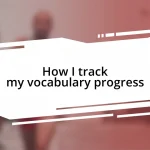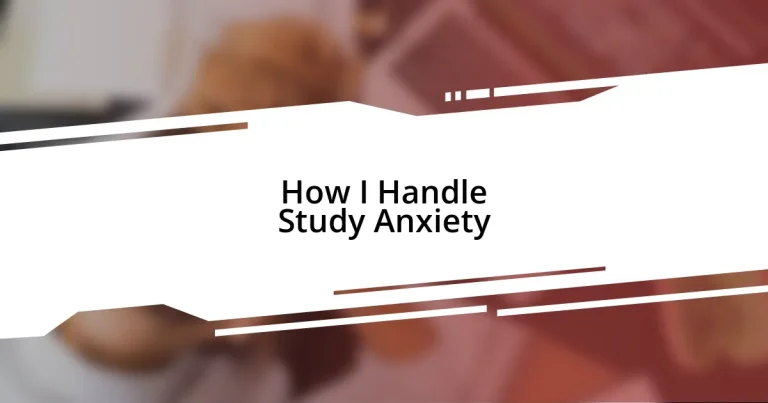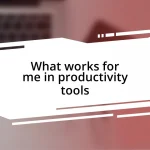Key takeaways:
- Study anxiety is common among students and can stem from perfectionism and fear of failure; understanding its roots helps in managing it.
- Recognizing physical and mental symptoms of anxiety, like racing heart and inability to concentrate, is crucial for implementing effective strategies.
- Creating structured study habits, such as establishing a study schedule and limiting distractions, can significantly reduce anxiety and improve focus.
- Incorporating mindfulness techniques and journaling aids in processing emotions, leading to a clearer, more manageable study experience.
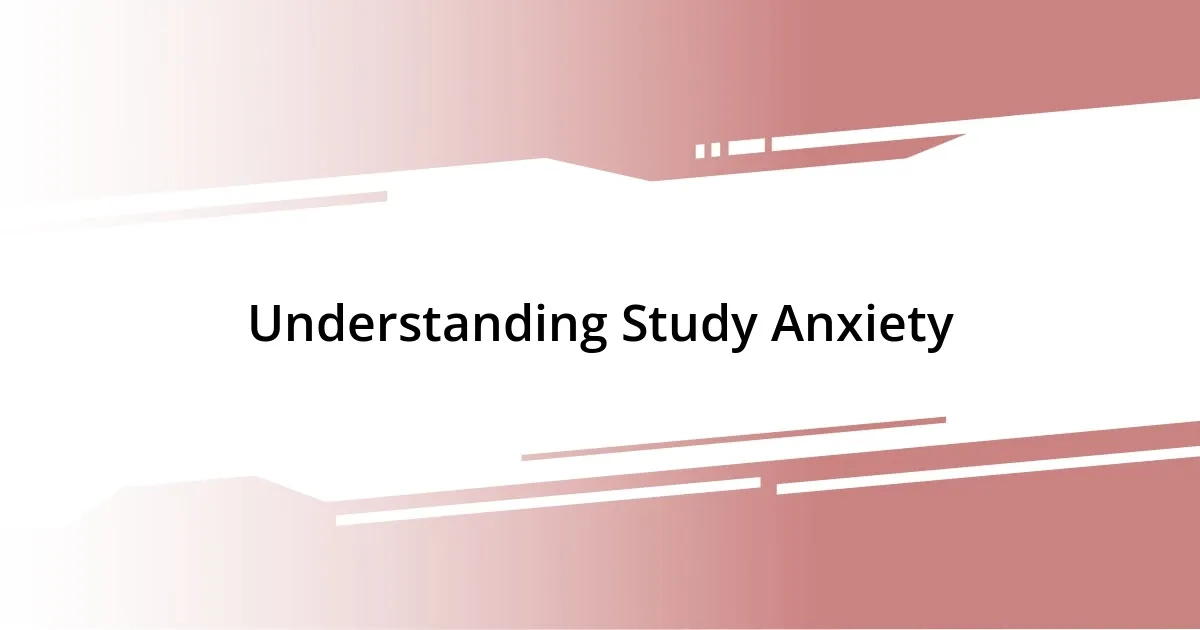
Understanding Study Anxiety
Study anxiety, I’ve found, often sneaks up on us when we least expect it. I recall sitting down with my study materials, feeling an overwhelming rush of dread as deadlines loomed. Have you ever felt that tight knot in your stomach when a big exam is approaching? It can trigger a cycle of self-doubt that distracts you from actually learning.
It’s fascinating how common study anxiety is among students, but it often goes unspoken. I remember sharing my worries with a friend, only to discover they felt the exact same way. This realization brought some relief—knowing I wasn’t alone felt almost comforting. Isn’t it interesting how talking about our fears can dissolve them, at least a little?
For me, understanding the roots of study anxiety has been key to handling it. I’ve learned that it can stem from perfectionism, fear of failure, or past experiences with tests. Can you relate? Recognizing that these feelings are a normal part of the academic journey often provided me with a sense of control. Now, instead of letting anxiety overwhelm me, I try to unravel its causes—it really does make a difference.
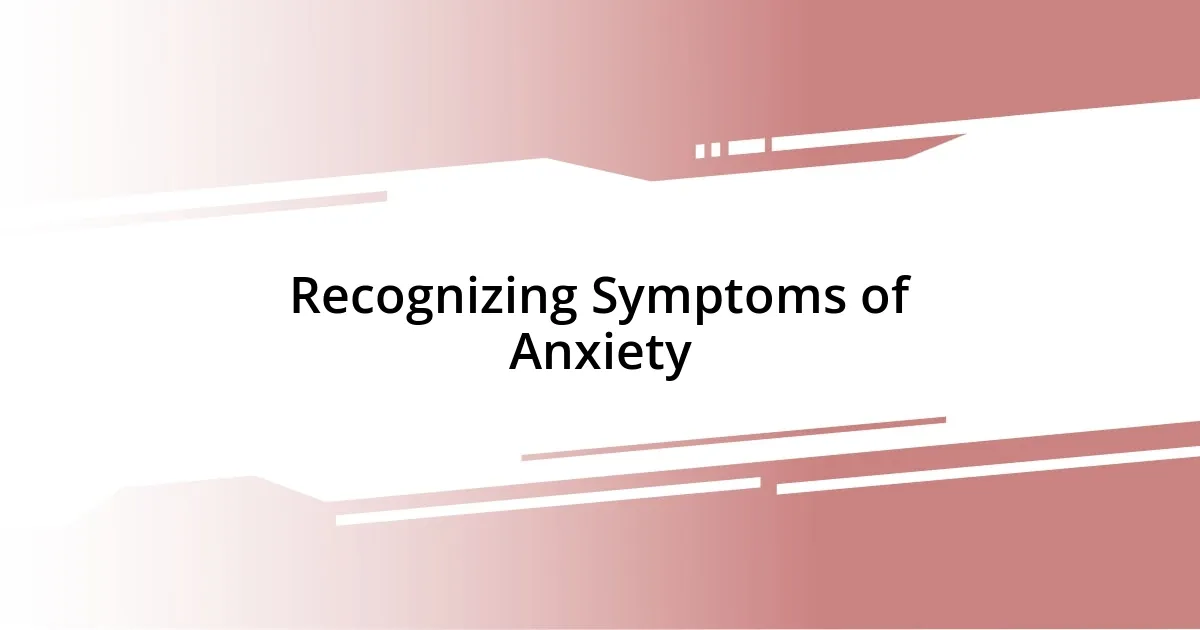
Recognizing Symptoms of Anxiety
You know, recognizing the symptoms of anxiety can be a game changer when it comes to handling study-related stress. I remember a particular night before an important exam when my heart started racing unexpectedly. It was like a little alarm going off inside me, signaling that something was off. This racing heart, along with a sense of unease, made it clear I was experiencing anxiety. Have you ever noticed how those physical reactions can sneak up on you just as you’re trying to focus?
Sometimes, the signs of anxiety are even more subtle. For instance, I found myself constantly checking my notes but not really absorbing anything. The mind wanders, and soon enough, I’m more anxious about not studying than about the actual content. It’s funny how that works, isn’t it? The inability to concentrate is a symptom I now recognize. I’ve learned to accept that if I’m feeling fuzzy-headed or overly alert, it likely means anxiety is creeping in.
It’s essential to tune into our bodies during these moments. Do you notice muscle tension when you’re stressed? I do, especially in my shoulders; they feel like rocks when anxiety hits. Understanding these physical cues has helped me implement strategies to alleviate stress before it escalates. This awareness can help us help ourselves, turning the tide in our study habits.
| Physical Symptoms | Mental Symptoms |
|---|---|
| Racing heart rate | Inability to concentrate |
| Muscle tension | Excessive worrying |
| Fatigue | Feeling overwhelmed |
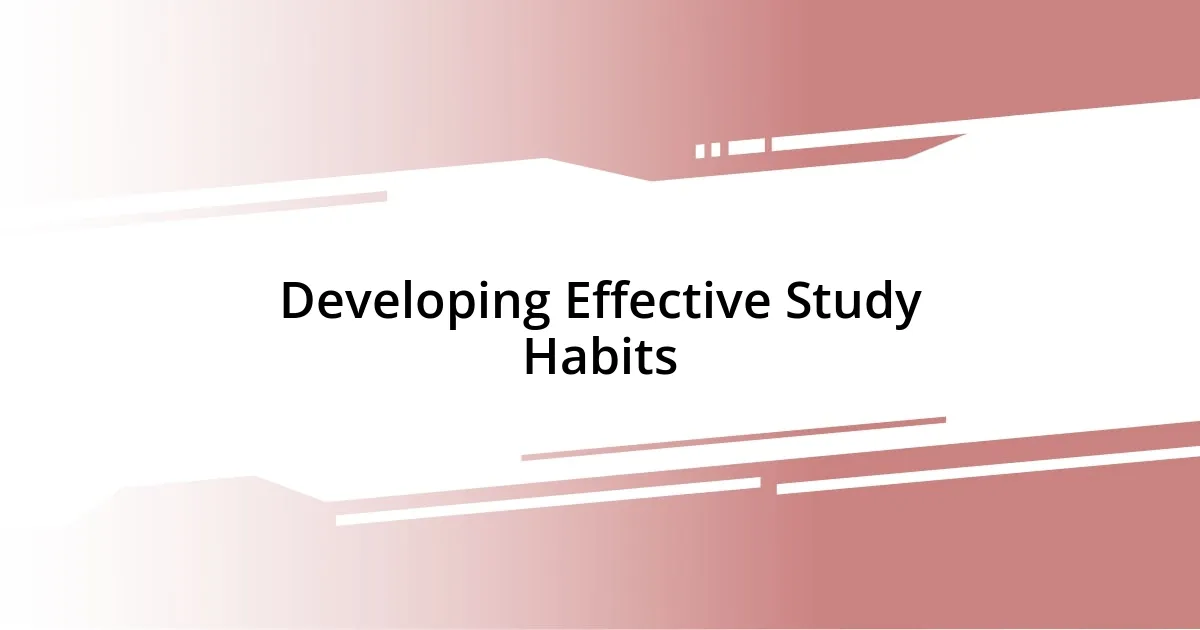
Developing Effective Study Habits
Developing effective study habits is something I’ve really honed over the years. I used to flounder around, unsure of where to start, but then I realized the importance of creating a structured study environment. For me, that meant setting aside a specific study area that was free from distractions. I can still picture the day I rearranged my room; the fresh setup made a world of difference in my focus and motivation.
Here are some habits that have significantly helped me:
- Create a Study Schedule: I found that mapping out my study time not only helped me stay organized but also eased the pressure of last-minute cramming.
- Set Realistic Goals: I break my study sessions into manageable chunks. For instance, I aim for 25 minutes of focused studying followed by a 5-minute break. This technique, called the Pomodoro Technique, keeps my energy levels up.
- Limit Distractions: I turn off my phone notifications and use apps that block distracting websites. Knowing I won’t get interrupted allows me to dive deep into my studies.
- Stay Hydrated and Snack Smart: I always keep a bottle of water nearby and some healthy snacks. Staying fueled helps my brain power through those difficult chapters.
- Review Regularly: Instead of cramming, I revisit material weekly. This reinforces my learning and makes the material feel more manageable over time.
As I developed these habits, I noticed my anxiety levels start to drop. The more I prepared, the less I fretted about exams. It’s like building a safety net for my studies—having that structure made everything feel less daunting. Over time, I learned to embrace this process, viewing studying not just as a chore but as an enriching experience, turning dread into excitement. I hope that by sharing these insights, you can find ways to transform your study habits too.
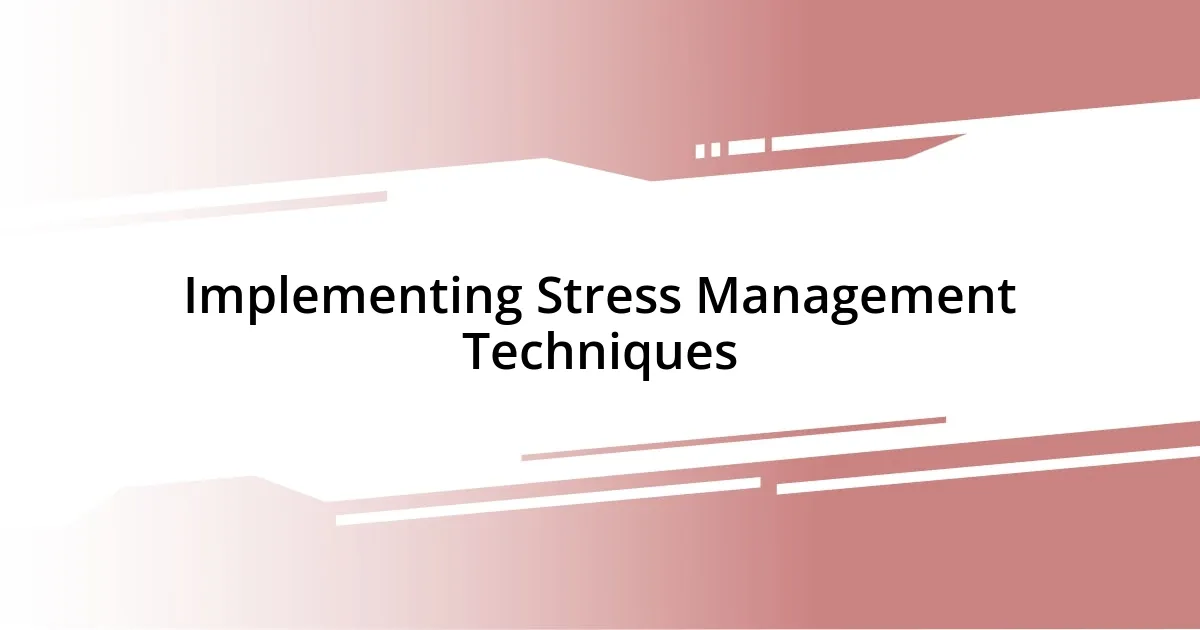
Implementing Stress Management Techniques
There have been moments when the weight of all that studying made me feel like I was buried alive. One technique that truly resonated with me was deep breathing. I recall a time during finals when I found myself staring blankly at my textbook, my mind racing. It felt like I was drowning in information. So, I took a moment to close my eyes and breathe deeply—inhale for four seconds, hold for four, exhale for four. It’s amazing how such a simple act can anchor you back to the present and relieve tension. Have you ever tried this? You might be surprised at how much clarity it brings.
Another approach that has made a significant difference for me is incorporating physical activity into my daily routine. I never realized how powerfully movement affects my mood until I started taking short walks during study breaks. Just a brisk 10-minute walk outside can transform my mindset. The fresh air, coupled with a change of scenery, rejuvenates me and helps shake off those anxious thoughts. I’ve often wondered, how often do we allow ourselves little breaks like this? Taking that time for myself not only clears my head, but it also recharges my motivation to dive back into studying.
Lastly, I’ve learned the importance of connecting with others. I used to think that tackling my study load solo was the way to go. But opening up to a friend or studying with a group has been a game-changer. Sharing thoughts and concerns not only lessens my anxiety but also allows for collaborative learning. I can still remember a study session over coffee where we tackled complex concepts together, transforming what felt insurmountable into something manageable. When anxiety feels like a mountain, having a supportive network can turn it into a series of small hills. Have you thought about how much support can ease your study pressure? Engaging with others often brings fresh perspectives, making the process more enjoyable and less stressful.
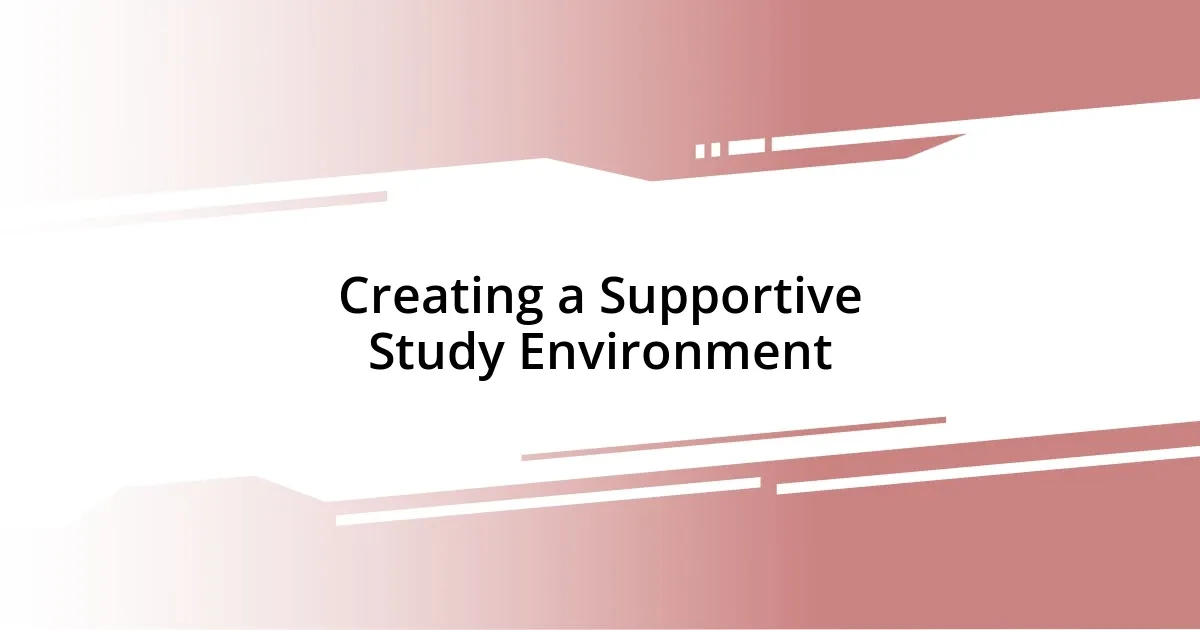
Creating a Supportive Study Environment
Creating a supportive study environment transformed my approach to learning. One change I made was to personalize my study space. I added some motivational quotes on the wall and a few plants to bring life and positivity to the area. It sounds simple, but I can’t emphasize enough how much it shifted my mindset. Do you ever find that your surroundings affect your mood? I realized that making my study area inviting made a world of difference in how I felt while studying.
Another key aspect for me was organizing my materials. I invested in a planner to keep track of assignments and deadlines. By dedicating a section to jotting down my thoughts or questions, I created a space where my mind felt less cluttered. This organization reduced my anxiety as I could easily refer back to what I needed to focus on next. Have you ever struggled to remember everything you have to do? When I streamlined how I interacted with my study resources, it was like a weight lifted off my shoulders.
Lastly, I learned the power of sound in my study environment. I discovered classical music and lo-fi beats that help me concentrate without distraction. On days when my mind races, I simply put on my headphones and let the rhythms wash over me. It’s amazing how the right background can make studying not just more manageable, but enjoyable as well. How does music influence your concentration? Experimenting with different soundscapes has definitely enriched my study experience, turning it into a time I actually look forward to.
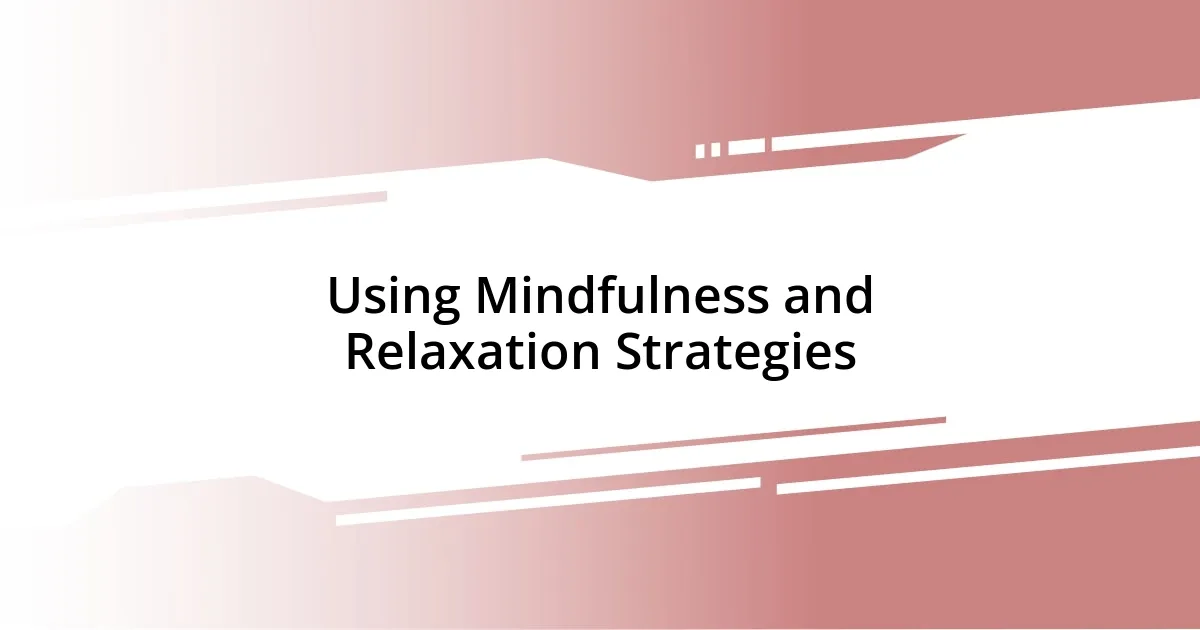
Using Mindfulness and Relaxation Strategies
Mindfulness has become one of my go-to strategies for managing study anxiety. One afternoon, I found myself spiraling into panic while prepping for an important exam. I decided to try a short meditation. I focused on my breath, counting each inhale and exhale, and noticed how quickly my racing thoughts began to settle. This practice has taught me that being present can create a bubble of calm, even amidst the chaos of studying. Have you ever felt your mind racing, and then discovered stillness simply by focusing on your breath?
In addition to meditation, I’ve started incorporating progressive muscle relaxation into my routine. I remember one evening vividly; stress from an upcoming paper left me tense and exhausted. Following a guided session, I went through each muscle group, tensing and then relaxing them. The difference was profound—I felt weightless afterward. This technique illustrates just how closely linked our bodies and minds are; when we physically release tension, it’s like unburdening our minds too. Have you experienced a release like that? It’s liberating.
Lastly, I’ve found journaling to be an incredible tool for anxiety management. Whenever I’m overwhelmed, I take a few moments to write down my thoughts and feelings. I recall one instance where I poured out my fears about failing, only to realize I was putting unnecessary pressure on myself. Writing not only helps me process my emotions but also clarifies my thoughts, making everything feel more manageable. How often do we give ourselves the space to truly understand our feelings? I believe that dedicating time to reflect can be transformative, turning anxiety into action.
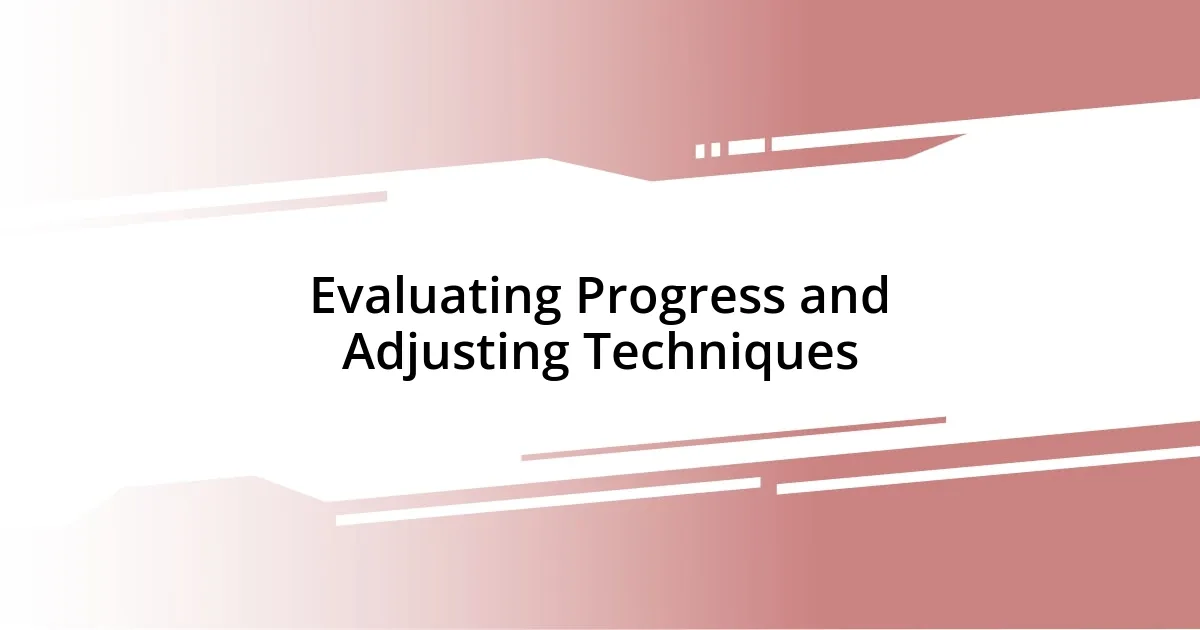
Evaluating Progress and Adjusting Techniques
As I evaluate my progress, I often set aside time to reflect on what’s working and what’s not. For instance, after realizing that certain study techniques were leaving me frazzled, I took a step back and re-evaluated my approach. Do you ever pause to think about whether your methods truly serve you? This practice allows me to tweak my strategies and implement changes that better fit my evolving needs.
Tracking my achievements, no matter how small, has been incredibly motivating. I remember the thrill I felt when I completed a challenging topic that I once dreaded; it acted as a reminder of my capability. Celebrating these milestones keeps my spirits high, but it also illuminates areas where I might need to adjust my techniques. Have you kept a record of your progress? It might surprise you to see just how far you’ve come.
Being flexible with my study techniques has proven vital in my journey. A few months ago, I was stuck in a rut using flashcards that just didn’t resonate with me. By switching to interactive quizzes instead, I found my retention improved drastically. Changing gears when something isn’t working is essential; it’s a lesson that highlights the importance of being kind to myself in the process. What barriers do you face when making changes in your study routine? I often remind myself that growth comes from pushing those boundaries.










